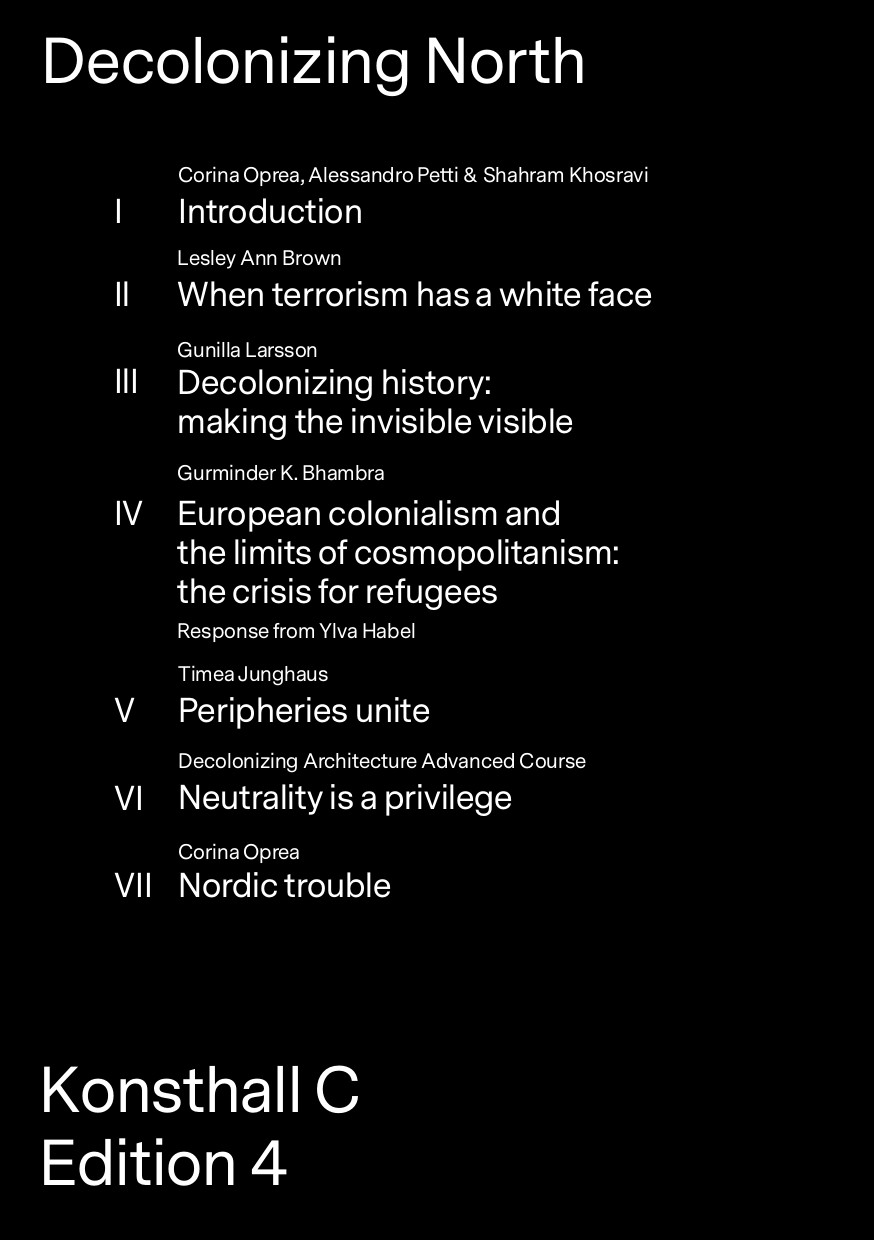Decolonizing North (2018)
Filed under book | Tags: · colonialism, decoloniality, nordics, racism, scandinavia

“The north is not only a geographical expression, it indicates often a power relation based on presumption of superiority. Despite violent border regimes and colonial processes on indigenous populations, northern European countries have scarcely dealt with their self-image of colonial powers. Is decolonization today a possible political project of liberation against this historical prejudice? What is at stake and how should we position ourselves within an imperative process of decolonization in relation to land and knowledge? In particular, how to de-align from the reproduction of oppressive structures and look instead to new alliances between native and migrants’ populations, and towards solidarity practices within art, discourse and immediate locality.
Addressing a range of topics in relation to contemporary colonial forms, inner-nordic colonialization of Sámi and Inuit, reflections on decolonizing terminologies, white supremacy the publication focuses on questions of decoloniality and its meaning for the particularities of North Europe today.”
Contributors: Lesley Ann Brown, Gunilla Larsson, Gurminder K. Bhambra, Ylva Habel, Timea Junghaus, Decolonizing Architecture Advanced Course, Corina Oprea.
Edited by Elof Hellström, Samuel Girma, Corina Oprea, and Alessandro Petti
Publisher Konsthall C, Stockholm, 2017
95 pages
Mikkel Bolt, Jakob Jakobsen (eds.): Cosmonauts of the Future: Texts from the Situationist Movement in Scandinavia and Elsewhere (2015)
Filed under book | Tags: · 1950s, 1960s, 1970s, art, capitalism, everyday, life, politics, scandinavia, situationists, spectacle

“This is the first ever English-language anthology collecting texts and documents from the still little-known Scandinavian part of the Situationist movement.
The book covers over three decades of writing, from Asger Jorn’s Luck and Chance published in 1953, to the statements of the Situationist Antinational set up by Jens Jørgen Thorsen and J.V. Martin in 1974. The writings collected gravitate around the year 1962 when the Situationist movement went through it’s most dynamic and critical moments, and the disagreements about the relationship between art and politics came to a culmination, resulting in exclusions and the split of the Situationist International.
The Situationists did not win, and the almost forgotten Scandinavian fractions even less so. The book broadens the understanding of the Situationist movement by bringing into view the wild and unruly activities of the Scandinavian fractions of the organisation and the more artistic, experimental, and actionist attitude that characterised them. They did, nevertheless, constitute a decisive break with the ruling socio-economic order through their project of bringing into being new forms of life. Only an analysis of the multifaceted and often contradictory Situationist revolution will allow us to break away from the dull contemplation of yet another document of Debord’s archive or yet another drawing by Jorn.
There is a lot to be learned from the history of revolutionary failure. It is along these lines that this book points forward beyond the crisis-ridden capitalist order that survives today.”
Texts by Asger Jorn, Jørgen Nash, Jens Jørgen Thorsen, Bauhaus Situationniste, Jacqueline de Jong, Gordon Fazakerley, Gruppe SPUR, Dieter Kunzelman, J.V. Martin, and Guy Debord.
Translated by Peter Shield, James Manley, Anja Buchele, Matthew Hyland, Fabian Tompsett, and Jakob Jakobsen
Publisher Nebula, Copenhagen, in association with Autonomedia, New York, May 2015
This book can be freely pirated and quoted except for the texts covered by copyrights.
ISBN 9788799365180 (Nebula), 9781570273049 (Autonomedia)
304 pages
Publisher (Nebula)
Distributor (Minor Compositions)
See also Bolt, Jakobsen (eds.), Expect Anything Fear Nothing: The Situationist Movement in Scandinavia and Elsewhere, 2011.
More on Situationists
Nordics in Global Crisis: Vulnerability and Resilience (2010)
Filed under report | Tags: · banking, economy, finance, financial crisis, nordics, scandinavia

The world is experiencing its worst slump since the Great Depression in the 1930s. The Nordic countries have, with the exception of Norway, been hit harder than most. Due to its sharpness and depth, the crisis is opening up or reviving a broad agenda of important policy issues. This report raises a number of the issues and discusses the scope for economic policies to contribute to the resolution of key economic problems.
The report can be seen as a sequel and as complementary to an earlier report on the Nordic Model, presented two years earlier by a team including three of the authors of the present report. While the earlier report was focused on structural issues, the one at hand is about macroeconomic and financial issues.
The members of the team are eminent economists and authoritative experts on the issues covered. The report is a joint product, reflecting
Authors Thorvaldur Gylfason, Bengt Holmström, Sixten Korkman, Hans Tson Söderström, Vesa Vihriälä
Publisher Taloustieto Oy, Helsinki, 2010
Volume 242 of ETLA – The Research Institute of the Finnish Economy. Series B
ISBN 9516284957, 9789516284951
264 pages

